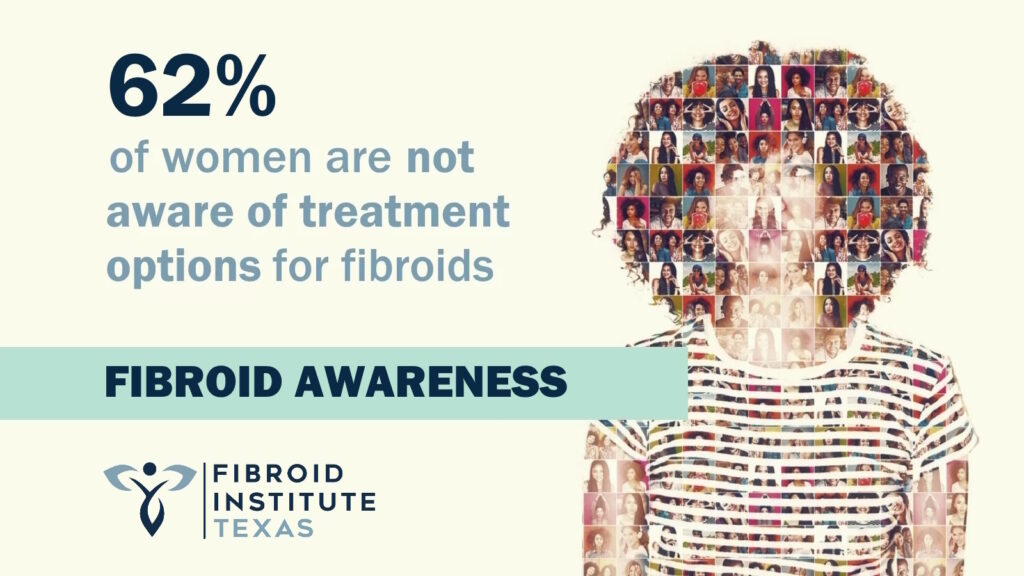For decades our team at Fibroid Institute Texas has been championing efforts to draw continued attention to uterine fibroids. But more than just being at the forefront of a non-invasive treatment option and empowering women to realize what they’re experiencing should not be normalized and that they can get back to enjoying life, it is important to take this fight to lawmakers and inspire passing key fibroid legislation. The goal is to reach even more women, stop the spread of misinformation, and generate research, community support, education, and funding for this important yet under-discussed topic. We’re excited to share that those collaborative efforts have not been in vain, thanks to Texas becoming the ninth state to recognize July as Uterine Fibroid Awareness Month. Beyond that, there is even more help on the way in the form of the Stephanie Tubbs Jones Uterine Fibroid Research & Education Act of 2023.
This key piece of fibroid legislation, also known as H.R. Bill 4572, has been brought to the table by Congresswoman Yvette D. Clarke. And while it is not yet passed, it could be soon. So, what does that mean? And what would it do for the estimated 171 million women worldwide who suffer from fibroids?
Spotlight on Fibroid Legislation
Uterine fibroid awareness on a state and national level has quickly grown over the past few years. Texas, California, Florida, Georgia, Maryland, New York, Pennsylvania, South Carolina, Virginia, and Washington D.C. have all stepped up and are committed to providing more women with support and accurate information about fibroid treatment and alternatives. They’re also pouring money into research and awareness programs that previously didn’t receive adequate funding. But there is still more work to be done.

Statistics show as of last year, 62% of women aren’t aware of treatment options for fibroids, which are noncancerous growths of the uterus. Others are hesitant to report, normalize their symptoms, or do not have access to adequate information and treatment. Fibroids still affect 70-80% of all women during childbearing years and disproportionately impact women of color. In fact, 80% of Black women will develop fibroids by the time they are 50, compared to 70% of white women. On top of that, almost $8 billion is spent on obstetric outcomes attributed to fibroids each year. Uterine fibroids cost women in the U.S. more than $17 billion annually through absenteeism and short-term disability.
Not every woman with fibroids has symptoms. But those who do say they have had their lives stripped away. Just a few of the more common life-interrupting symptoms include:
- Painful periods, debilitating cramps, pelvic pain, and pressure
- Heavy or abnormal menstrual bleeding
- Painful intercourse
- Fatigue and weakness
- Bloating or swelling in the lower abdomen
- Back or leg pain
- Urinary frequency
- Constipation, diarrhea, and rectal discomfort
How Would This New Bill Help?
According to a recent press release, the Stephanie Tubbs Jones Uterine Fibroid Research and Education Act of 2023 would revolutionize nationwide uterine fibroid care and acknowledge fibroids as the serious health crisis it is.
Specifically, the bill would:
- Establish new research funding through the National Institute of Health — Coordinated efforts would be made to expand research on fibroids. A reported $30 million for each fiscal year, totaling $150 million, will be poured into the project over the next five years.
- Expand a Centers for Medicaid & Medicare database on chronic conditions — This includes collecting data on the frequency of services provided to fibroid sufferers. Doing so will help policymakers make more informed decisions.
- Create a public education program through the CDC — The program will focus on the prevalence of fibroids, especially among Black women, and let them know of alternative treatment options other than a hysterectomy.
- Direct HRSA to develop and disseminate fibroid information to healthcare providers — With this fibroid legislation, there should be an uptick in evidence-based care as well as collaborative efforts among healthcare providers so that available treatment options are made known to every patient.
Click here for the full text of the Stephanie Tubbs Jones Uterine Fibroid Research And Education Act of 2023.

The bill also highlights the need for improved patient and provider education surrounding the heightened risk for fibroids faced by women of color. Congresswoman Clarke was quoted in the press release as saying, “In a nation where approximately 25% of all Black women will suffer from uterine fibroids before their 25th birthday, there exists a glaring, tragic health inequity that must be addressed. Fibroids have ravaged the lives of women—particularly in the Black community—across the country and increasing funding for research and public education related to fibroids is critical to reversing this devastating trend. The Stephanie Tubbs Jones Uterine Fibroid Research and Education Act is an important step towards prioritizing women’s healthcare with the urgency it warrants.”
Founder and Medical Director of Fibroid Institute, Dr. Suzanne Slonim, agreed. “My hope is that increased attention on fibroids and their symptoms will eradicate the stigma of talking about menstrual symptoms and help women make informed decisions about their healthcare. The challenges of making more women aware of fibroids and their symptoms can be daunting but are not insurmountable.”
Through Fibroid Legislation, More Women Can Learn About UFE
At Fibroid Institute Texas, we specialize in an alternative to fibroid surgery called uterine fibroid embolization (UFE). For years, the standard method of care for many doctors was to promote surgical procedures such as hysterectomy and myomectomy. But many women are realizing through fibroid legislation and continued education that they have options and that it is wise to seek a second opinion.
With UFE, there is no bloody surgery and lengthy recovery times. More importantly, you have a say over what happens to your body. UFE is faster and highly effective. Rather than making incisions, the experienced fibroid doctors at Fibroid Institute insert small particles through a tiny catheter at the wrist using image-guided interventional radiology. The particles are introduced through the uterine arteries into the fibroid vessels, blocking blood flow to the fibroids. By cutting off blood flow to all fibroids, the fibroids shrink and die so that you can get back to your lifestyle and normal activities quickly.

Benefits to UFE patients of Fibroid Institute include:
- Over 90% effective in relieving fibroid symptoms
- Covered by most major medical insurance
- Procedure typically completed in under an hour
- Recovery period is as little as one week in many cases
- All fibroids may be treated at the same time
- No incision or vaginal access, just a small puncture on your wrist
- Doctors are 100% dedicated to fibroids and UFE
- Referrals are not required but are encouraged
- Mobile number given to every UFE patient to contact her doctor directly
Our Fibroid Experts and UFE Specialists Want to Help
Fibroid legislation such as the Stephanie Tubbs Jones Uterine Fibroid Research And Education Act of 2023 is further proof that lawmakers are listening. That said, it is imperative that everyone keeps pushing for more change. The goal is to spread fibroid awareness on a worldwide level so that more women can be supported and cared for while at the same time understanding their condition and gaining confidence from the very start.
Fibroid awareness is here for a reason—to educate and bring change. Women visit Fibroid Institute Texas year-round to find relief from their fibroid symptoms. We are happy to cater to those needs and offer an advanced, nonsurgical solution: uterine fibroid embolization (UFE). Our fibroid doctors are board-certified interventional radiologists and experts who are passionate about helping women become #FibroidFree. Dr. Suzanne Slonim and Dr. John Fischer are highly experienced UFE specialists, 100% focused on fibroid issues.
With each UFE procedure, patients realize they don’t have to be limited by fibroid symptoms or lengthy recovery times. For many women with fibroids, the UFE procedure changed their lives. Request a free 10-15 minute phone screening to determine if you are eligible. After the screening, if you qualify for UFE, you can schedule your onsite or telehealth consultation. Most major medical insurance providers cover the cost of UFE.
At Fibroid Institute and with multiple locations, our Houston and Dallas fibroid centers are dedicated to helping you become #FibroidFree. Get started now with Fibroid Institute Dallas at 214-838-6440 or with Fibroid Institute Houston at 713-903-3733 or complete the form below.
Prior to starting any new treatment or if you have questions regarding a medical condition, always seek the advice of your doctor or other qualified health provider. This information is not a substitute for professional medical advice.
Fibroid Institute Texas serves the Dallas and Houston areas including Highland Park, University Park, Park Cities, Garland, Mesquite, Richardson, Dallas, Sherman, Houston, Sugar Land, Katy, Webster, Clear Lake, The Woodlands, Universal City, Spring, Kingwood, Stafford, Conroe, Texas City, Cypress, League City, Bellaire, Addison, Carrollton, Plano, Frisco, McKinney, Allen, Fort Worth, Grand Prairie, HEB, Arlington, Hutchins, Irving, Duncanville, DeSoto, Cedar Hill, Lancaster, Cockrell Hill, and more.
*Patient stories are true. Names and/or photos may be changed to protect patient confidentiality.

